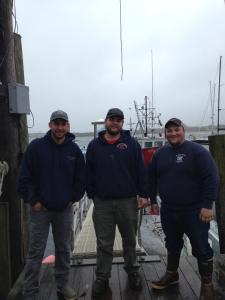Tom Birarelli, Tim Birarelli, and Robbie Budds

Young Fishermen in the Northeast United States
Interviews with 39 fishers between the ages of 18-35, located along the US East Coast from Maine to North Carolina. Collectively, they represent a wide variety of gear types and fisheries. All had been fishing full-time for at least two years and wanted to make fishing their career. They describe motivations for choosing a fishing career, strategies used, barriers encountered, and facilitating factors that have enabled interviewees to defy the graying trend to become successful fishermen.
Please visit the Voices SoundCloud page to explore clips and stories that relate to this collection.
Sarah Schumann
Tim Birarelli, Tom Birarelli, Robbie Budds (ages 21, 18, and 21 at the time of the interview) are lobstermen in Beverly, MA. Tim and Tom grew up lobstering with their father, who passed away when they were in their teens. They continued running and eventually expanding the family fishing businesses, and they supply fresh seafood to their mother's restaurant. Robbie met Tim through a hockey league while in high school, and the two brothers helped him get set up with a lobster boat and taught him everything they know. Now, the three young fishermen captain their individual boats, but they work as a team, sharing knowledge and experimenting together with new fisheries such as scallops. Robbie credits Tim and Tom's friendship for enabling him to build a successful fishing career before even graduating from college.
Scope and Content Note
Tom Birarelli, Tim Birarelli, and Robbie Budds discuss their experiences in the fishing industry. The interview covers various topics including their backgrounds, entry into fishing, vessels, education, and passion for fishing. They highlight the addictive nature of fishing, the allure of the job, financial potential, and the freedom of being self-employed. They also discuss the impact of their father's passing on their fishing careers and the importance of mentorship from experienced relatives who have been lifelong fishermen.
They primarily engage in day boat lobstering and have ventured into scalloping as an additional income source due to regulations and the potential for year-round fishing. The fishermen discuss their transition away from gillnetting, citing increasing regulations as the main reason. They mention a specific regulation that significantly limited their fishing days at sea, making gillnetting financially unsustainable. They voice concerns about the future of the lobster industry, emphasizing the need for diversification and alternative fishing options.
Financial challenges and the disparity in funding and lobbying power between fishermen and environmental groups are also discussed. The fishermen express concerns about the disadvantage they face and emphasize the importance of unity among fishermen to advocate for a balanced approach that allows for sustainable fishing practices. They highlight the economic significance of the fishing industry to the local economy and stress the need for a more balanced approach that considers conservation and the sustainability of the fishing industry.
Please Note: The oral histories in this collection are protected by copyright and have been created for educational, research and personal use as described by the Fair Use Doctrine in the U.S. Copyright law. Please reach out Voices@noaa.gov to let us know how these interviews are being used in your research, project, exhibit, etc. The Voices staff can help provide other useful resources related to your inquiry.
The NOAA mission is to understand and predict changes in climate, weather, oceans, and coasts, to share that knowledge and information with others, and to conserve and manage coastal and marine ecosystems and resources. The Voices Oral History Archives offers public access to a wide range of accounts, including historical materials that are products of their particular times, and may contain offensive language or negative stereotypes.
Voices Oral History Archives does not verify the accuracy of materials submitted to us. The opinions expressed in the interviews are those of the interviewee only. The interviews here have been made available to the public only after the interviewer has confirmed that they have obtained consent.
